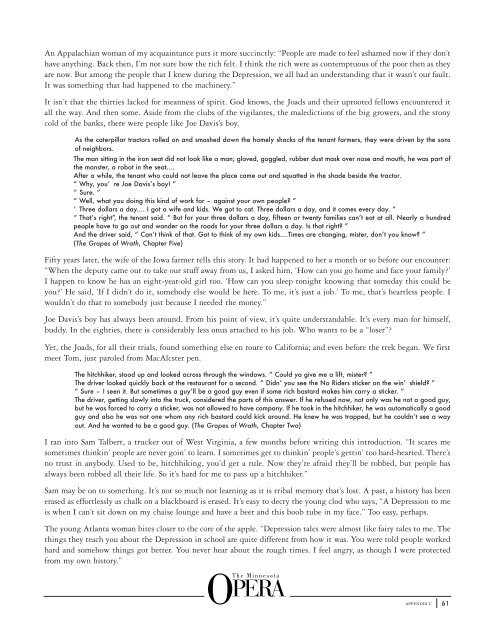You also want an ePaper? Increase the reach of your titles
YUMPU automatically turns print PDFs into web optimized ePapers that Google loves.
An Appalachian woman of my acquaintance puts it more succinctly: “People are made to feel ashamed now if they don’t<br />
have anything. Back then, I’m not sure how the rich felt. I think the rich were as contemptuous of the poor then as they<br />
are now. But among the people that I knew during the Depression, we all had an understanding that it wasn’t our fault.<br />
It was something that had happened to the machinery.”<br />
It isn’t that the thirties lacked for meanness of spirit. God knows, the Joads and their uprooted fellows encountered it<br />
all the way. And then some. Aside from the clubs of the vigilantes, the maledictions of the big growers, and the stony<br />
cold of the banks, there were people like Joe Davis’s boy.<br />
As the caterpillar tractors rolled on and smashed down the homely shacks of the tenant farmers, they were driven by the sons<br />
of neighbors.<br />
The man sitting in the iron seat did not look like a man; gloved, goggled, rubber dust mask over nose and mouth, he was part of<br />
the monster, a robot in the seat.…<br />
After a while, the tenant who could not leave the place came out and squatted in the shade beside the tractor.<br />
“ Why, you’ re Joe Davis’s boy! ”<br />
“ Sure. ”<br />
“ Well, what you doing this kind of work for – against your own people? ”<br />
‘ Three dollars a day.… I got a wife and kids. We got to cat. Three dollars a day, and it comes every day. ”<br />
“ That’s right”, the tenant said. “ But for your three dollars a day, fifteen or twenty families can’t eat at all. Nearly a hundred<br />
people have to go out and wander on the roads for your three dollars a day. Is that right? ”<br />
And the driver said, “ Can’t think of that. Got to think of my own kids.…Times are changing, mister, don’t you know? ”<br />
(The <strong>Grapes</strong> of Wrath, Chapter Five)<br />
Fifty years later, the wife of the Iowa farmer tells this story. It had happened to her a month or so before our encounter:<br />
“When the deputy came out to take our stuff away from us, I asked him, ‘How can you go home and face your family?’<br />
I happen to know he has an eight-year-old girl too. ‘How can you sleep tonight knowing that someday this could be<br />
you?’ He said, ‘If I didn’t do it, somebody else would be here. To me, it’s just a job.’ To me, that’s heartless people. I<br />
wouldn’t do that to somebody just because I needed the money.”<br />
Joe Davis’s boy has always been around. From his point of view, it’s quite understandable. It’s every man for himself,<br />
buddy. In the eighties, there is considerably less onus attached to his job. Who wants to be a “loser”?<br />
Yet, the Joads, for all their trials, found something else en route to California; and even before the trek began. We first<br />
meet Tom, just paroled from MacAlcster pen.<br />
The hitchhiker, stood up and looked across through the windows. “ Could ya give me a lift, mister? ”<br />
The driver looked quickly back at the restaurant for a second. “ Didn’ you see the No Riders sticker on the win’ shield? ”<br />
“ Sure – I seen it. But sometimes a guy’ll be a good guy even if some rich bastard makes him carry a sticker. ”<br />
The driver, getting slowly into the truck, considered the parts of this answer. If he refused now, not only was he not a good guy,<br />
but he was forced to carry a sticker, was not allowed to have company. If he took in the hitchhiker, he was automatically a good<br />
guy and also he was not one whom any rich bastard could kick around. He knew he was trapped, but he couldn’t see a way<br />
out. And he wanted to be a good guy. (The <strong>Grapes</strong> of Wrath, Chapter Two)<br />
I ran into Sam Talbert, a trucker out of West Virginia, a few months before writing this introduction. “It scares me<br />
sometimes thinkin’ people are never goin’ to learn. I sometimes get to thinkin’ people’s gettin’ too hard-hearted. There’s<br />
no trust in anybody. Used to be, hitchhiking, you’d get a rule. Now they’re afraid they’ll be robbed, but people has<br />
always been robbed all their life. So it’s hard for me to pass up a hitchhiker.”<br />
Sam may be on to something. It’s not so much not learning as it is tribal memory that’s lost. A past, a history has been<br />
erased as effortlessly as chalk on a blackboard is erased. It’s easy to decry the young clod who says, “A Depression to me<br />
is when I can’t sit down on my chaise lounge and have a beer and this boob tube in my face.” Too easy, perhaps.<br />
The young Atlanta woman bites closer to the core of the apple. “Depression tales were almost like fairy tales to me. The<br />
things they teach you about the Depression in school are quite different from how it was. You were told people worked<br />
hard and somehow things got better. You never hear about the rough times. I feel angry, as though I were protected<br />
from my own history.”<br />
appendix c<br />
61








